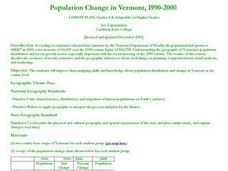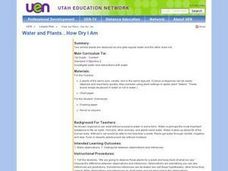Curated OER
The Dog Days of Data
Young scholars are introduced to the organization of data This lesson is designed using stem and leaf plots. After gather data, they create a visual representation of their data through the use of a stem and leaf plot. Students...
Curated OER
Threads
Students group observed data, filtering from all their observations the similarities between burring threads. In the second part they make a comparison of a chosen attribute between the two threads.
Curated OER
The Economic Differences Between the North and the South Prior to the Civil War
Seventh graders identify and explain the economic differences between the North and the South incorporating photographs and a Venn Diagram to interpret the two sides. They complete a KWL and T-chart to assist them with their task for the...
Curated OER
Technology-commected Folklife Lesson Plan: Fables
Learners discuss ways the stories were alike and different. The teacher demonstrate how to draw a Venn diagram using Microsoft Word. They label the two circles and enter the likenesses and differences on the diagram.
Curated OER
Population Change in Vermont, 1990-2000
Students improve their mapping skills and knowledge about population distribution and change in Vermont at the county level. They are divided into groups of two or four. Each group is given two county base maps and the population...
Curated OER
Choosing the Best Graph
Eighth graders produce and examine two sets of data and create what they believe to be the most appropriate graphs to represent these sets of data. After completing the pre-assessment, they discuss reasons for using each type of graph...
Curated OER
Limiting Reagent
Students work in small groups with a small set of 8 nuts and 5 bolts to assemble into combinations of 1 nut: 1 bolt, and 2 nuts: 1 bolt. They explore the outcome and discuss. Then a student mixes two clear, colorless solutions together...
Curated OER
Look Around You
Students make predictions about a book they are reading and use their background knowledge to make inferences. In this predictions lesson plan, students complete a worksheet that they are given.
Curated OER
Gone With The Wind
Students review the different types of natural disasters. As a class, they examine how people and communities deal with weather disasters. They compare and contrast how two communities respond to a tornado or hurricane. They present...
Curated OER
As Seen on TV
Sixth graders research how minority groups are represented in media. In this media literacy lesson, 6th graders investigate two YouTube clips of Hugo Chavez and discuss different points of view.
Curated OER
Measuring Snowfall
Students predict the amount of snowfall for the week and measure snowfall. In this measuring snowfall activity, student use a precipitation gauge to measure the week's snowfall; and analyze the data to determine whether or not...
Curated OER
Weather Olympics
Students consider the effects of topography on climate patterns. In this earth science lesson, students research weather patterns and make inferences of how the land forms may create different climates. Students compare Celsius...
Curated OER
All About Birds
Pupils study different kinds of birds, and demonstrate reading comprehension skills, including reading strategies, inference, literal meaning, and critical analysis.
Curated OER
Organizing Data Using Tables and Graphs
Students create graphs and tables, as well as interpret and make inferences from the data shown to determine when and where graphs and tables are most useful.
Curated OER
Keep it Complex
Students consider the importance of biodiversity in the ocean layers. In this oceanography lesson, students use the Shannon-Weaver diversity index to analyze data. Students analyze the information collected and write a report...
Kenan Fellows
Determining Stream Health by the Diversity and Types of Benthic Organisms
How diverse are the benthic organisms found in local streams? Using the information learned in previous lessons on identification of macroinvertebrates and on calculating stream index values, groups determine the health of local...
EngageNY
Listening Closely and Taking Notes: Colonial Trade Podcast About the Wheelwright
Voices from the past. Young scholars listen to a podcast interview with a historical re-enactor as they continue their research in the eleventh instructional activity of this unit on colonial trade. Applying their close reading skills,...
Curated OER
Water and Plants...How Dry I Am
First graders observe two similar plants as one gets water and the other does not. They make predictions and chart the growth of each. They draw pictures of the plants after one week.
Curated OER
Acid Precipitation
Students test the acidity of unknown solutions. They use this information to make inferences from data given from recorded rainfall records to identify areas that receive the most acid rain.
Curated OER
Statistics and Probility
Seventh graders collect data and make predictions. In this geometry instructional activity, 7th graders work in tiers collecting data and plotting it. They make inferences and predictions about their collected data.
Curated OER
Pulse
Students determine a baseline pulse rate then chart the changes in rate with exercise. They describe the changes and develop a rationale for their observations. The task assesses students' abilities to make simple observations, determine...
Curated OER
Finding Buck Henry
Students read and demonstrate competence in the general skills and strategies of the writing process via the novel "Finding Buck Henry." They recognize complex elements of plot. Students analyze devices used to develop characters in...
Curated OER
Collecting My School Family Data
Students are tasked with collecting data on their school. In groups, they collect data on various aspects of school life along with social and economic backgrounds and charactertics of their hair and eye color. They draw two pictures,...
Curated OER
Seeing Sound and Sonar
Young scholars grasp how underwater animals can "see" using sound waves. They practice making inferences, and build a conceptual understanding of sonar radar.

























